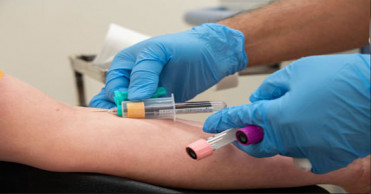You may have been referred to our Pancreas Unit from another hospital, or by GP referral system or admitted to one of our hospitals in Leeds.
Tests and investigations help to diagnose your pancreatic condition as well as providing us with an indication of your general health so we can offer the most suitable options for you. We require as much information as possible about your medical history and current symptoms you are experiencing. We may want to perform physical examination to establish the region of your pain, if you have any.

Blood Tests
are helpful to assess a variety of bodily functions within your body e.g. kidney function, infection markers, inflammation markers, tumour markers, anaemia.
Radiology
Ultrasound – An ultrasound scan uses a ‘jelly substance at the end of a probe’ providing pictures by using harmless sound waves that echoes from the targeted area to take pictures inside your abdomen. This test is a relatively painless quick and conveinient test that provides information of the pancreas, liver, bile ducts and gallbladder. You usually need to have clear fluids only 6 hours before this examination. The radiology department will advise what will be required prior to your examination.
CT Scan – A more in-depth complex scan compared to the ultrasound. However, this scan provides a detailed image of the pancreas and other organs within your abdomen. It is ‘doughnut’ shaped and you lie on a table to go ‘inside the middle of the doughnut’. The x-rays are then taken as very thin slices through the area of your abdomen. You may require to have a cannula inserted for this CT scan.
MRI Scan – This scan uses very strong magnetic fields to provide the pictures of your abdomen, unlike the CT scan which uses x-rays. You will lie on a table that goes inside a long metal cyclinder. This test can be particularly noisy and can sometimes make people feel isolated during this procedure. This test can take up to an hour. Again you won’t feel anything during this examination. You cannot have this scan if you have any metal work in your body and a you will be asked some safety questions prior to this examination being requested.
Octreotide Scan – A highly specilaised scan that can provide valuable information to asses pancreatic endocrine tumours. A synthesised hormone is ‘tagged’ with a radioactive marker is injected into your vein. The synthesised hormone resembles a natural bodily hormone. The scanner then tracks where this hormone has gone. The radiation of this scan is equivalent to a plain x-ray.
PET CT Scan – This is a sophisticated scan that highlights activity in your body. A substances that emits a tiny amount of radiation is temporarily attached to oxygen molecules which are taken up by very active tissues. The activity measured can be from tissues that require a lot of oxygen such as the heart or brain or cancer cells. The scanner then combines these pictures with the anatomical pictures from the CT scan and provides us with detailed information about the changes of activity.
For further information about the radiological scans as mentioned above, please click the link below to take you to the Leeds Radiology Department.
Endoscopy
Here at Leeds we have regional experts to help perform the Endoscopy procedures for our patients. An endoscope is a long flexible tube that can be inserted into the mouth, down the oesophagus and stomach and then into the duodenum, bile ducts, pancreas. There are various endoscopic procedures we offer at Leeds to allow us to assess a disease, take biopsies to confirm diagnosis or place stents to unblock an organ that is nor working in the way it should do.